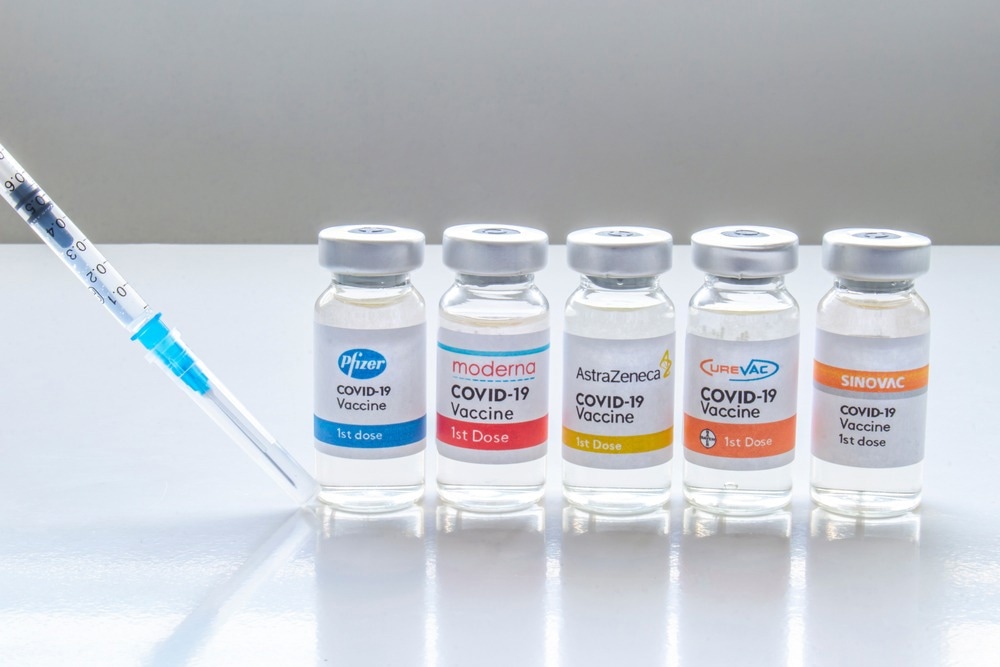VE against severe acute respiratory syndrome coronavirus 2 (SARS-CoV-2)-related infections, hospitalizations, and mortality were assessed according to several primary outcome(s) using three-level meta-analytic models.

Study: Long-term effectiveness of COVID-19 vaccines against infections, hospitalisations, and mortality in adults: findings from a rapid living systematic evidence synthesis and meta-analysis up to December 2022. Image Credit: oasisamuel / Shutterstock.com
About the study
In the present study, the Excerpta Medica Database (EMBASE) and United States National Institutes of Health's (NIH) iSearch COVID-19 portfolio was searched between January 1, 2020, and December 1, 2022.
Manual searches of published literature in French or English documenting VE immediately, within 112 days post-completion of a primary vaccination series, or 84 days post-boosting were also performed. While some reviewers assessed study titles, abstracts, and full text to extract data, another researcher verified the identified studies.
Randomized controlled trials (RCTs) and observational studies were included in the analysis if they explicitly reported VE data on adults by comparing fully vaccinated participants with unvaccinated counterparts. The reviewers extracted data for the larger grouping representing the complete sample or treated subgroups as separate samples. Likewise, from all versions, the study model considered those studies with the lowest risk of bias.
The study methodology accounted for within- and between-study heterogeneity and any potential effects of the study design. All extracted VE estimates were converted into log risk ratios (RRs) for analyses, and results were subsequently presented as VE percentages.
Study findings
Of the 68 studies extracted for this meta-analysis, 53 and 15 were peer-reviewed journals and preprints, respectively, with samples recruited from over 23 nations. While 39 studies used a case-control design, 26 were cohort studies. Furthermore, 4% of studies were RCTs, including one open-label trial.
The VE of the primary COVID-19 vaccination series was initially recorded to be about 83% between 14 and 42 days after the two-dose vaccination regime was completed. However, VE markedly decreased within 112 days post-vaccination and ultimately diminished to 47% by 280 days.
Regarding VE against COVID-19 hospitalizations and mortality, over 90% VE was reported at baseline. However, by 112 days post-vaccination, less than 75% VE against COVID-19 hospitalizations and mortality was recorded.
A similar VE waning pattern was observed for Omicron-only data; however, baseline VE levels were inadequate against infections or hospitalizations. This might be due to depleting immunogenicity, non-adherence to public health measures, and varying case numbers and SARS-CoV-2 transmission.
The VE of primarily mRNA vaccine booster doses within seven to 28 days post-boosting its VE remained slightly below the World Health Organization (WHO) recommendations, with VE levels reducing further over time.
The study data suggest that vaccination conferred consistently durable protection against hospitalizations and mortality. However, this protection was modest against breakthrough infections.
Regarding vaccine types used for primary vaccination, VE patterns changed over time and were consistent. Although mRNA and adenovirus-based vaccines had comparable VE against hospitalizations and mortality, their efficacy in preventing infection was similarly low.
Since VE against the SARS-CoV-2 Omicron variant was adequate at baseline and declined over time, early COVID-19 intervention measures, including non-pharmaceutical interventions (NPI) like quarantining, might help reduce viral transmission, COVID-19-related hospitalizations, and mortality.
Long-term immunological data are scarce after booster doses. One study reported marked reductions in neutralizing antibody (nAb) titers six months after boosting with CoronaVac. However, the reduction rate of nAb titers might vary with each subsequent dose.
Comparatively, another study observed that a primary mRNA vaccination series and one booster dose protected against Omicron infections at baseline; however, this protection was reduced after 112 days.
Conversely, primary vaccination with CoronaVac followed by BNT162b2 boosting was effective against Omicron infection to a greater extent than CoronaVac alone, with nAb reduction rates rapidly declining within 120 days post-boosting.
Notably, booster vaccination data involved the comparison of booster vaccination to unvaccinated individuals rather than against those who only received a primary vaccination series. Thus, future studies are needed to monitor the long-term VE of different vaccine doses, as many nations are now administrating second and third booster doses.
The researchers found consistent results across published and preprint studies amid the highly dynamic publishing landscape of COVID-19. However, lower VE values for the primary series of COVID-19 vaccination in preprint studies highlight the importance of including these studies in future meta-analyses.
Conclusions
The long-term VE assessments of four COVID-19 vaccines were insightful for researchers and clinicians and could help inform policy recommendations. The study analyses indicated that VE reduced over time against SARS-CoV-2 infections, hospitalizations, and mortality for both primary series and booster doses.
When assessed against the Omicron variant, baseline VE levels remained low and did not meet the WHO criteria for an adequate vaccine response. Thus, adhering to NPIs is essential for reducing the risk of Omicorn transmission. Nevertheless, more studies are needed to investigate the effectiveness of the simultaneous implementation of multiple transmission mitigation strategies.
Journal reference:
- Wu, N., Joyal-Desmarais, K., Ribeiro, P. A. B., et al. (2023). Long-term effectiveness of COVID-19 vaccines against infections, hospitalisations, and mortality in adults: findings from a rapid living systematic evidence synthesis and meta-analysis up to December, 2022. The Lancet Respiratory Medicine. doi:10.1016/S2213-2600(23)00015-2